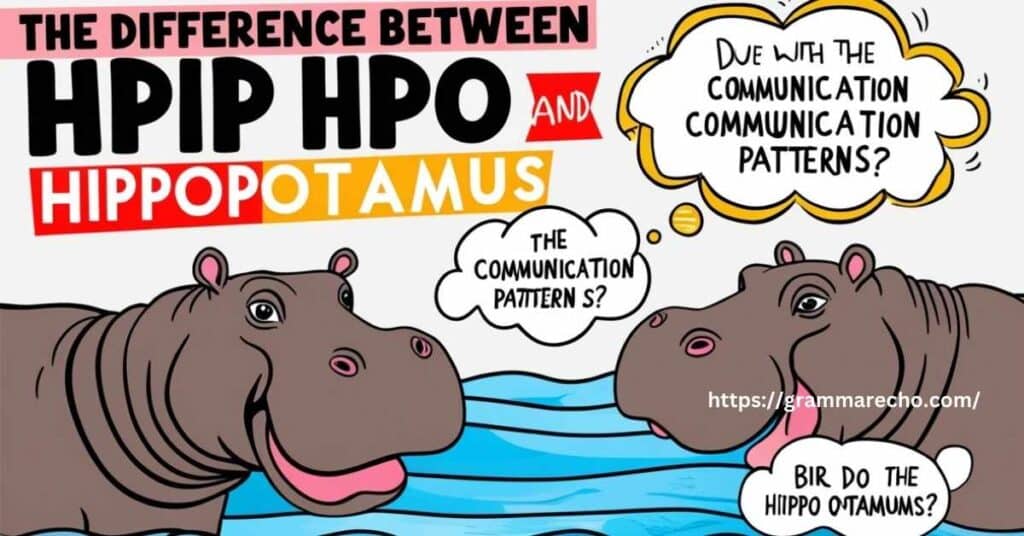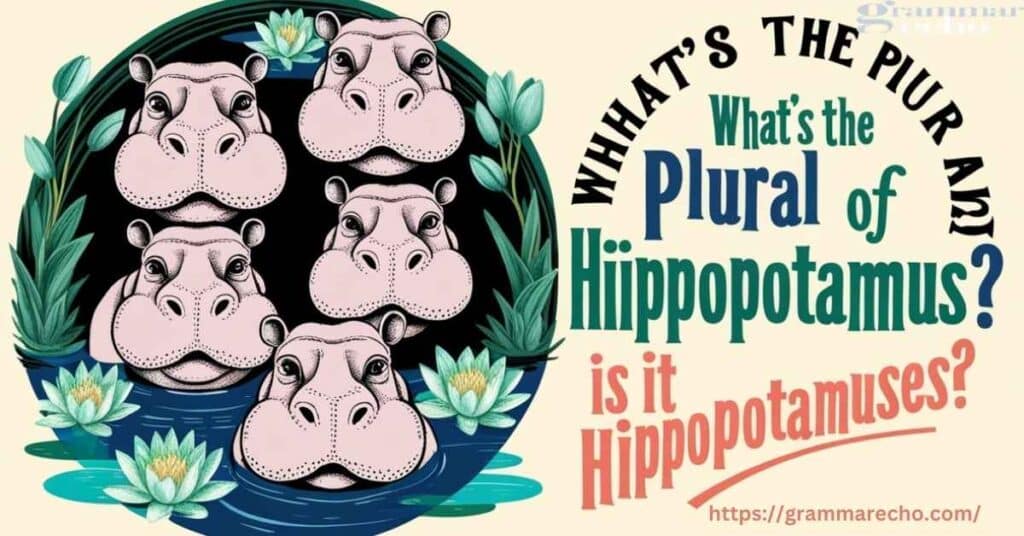Ever wondered about the correct “plural of hippopotamus” when describing these massive river dwelling animals? You’re not alone in this grammatical puzzle that stumps even seasoned writers. As we dive into the world of these fascinating creatures, we’ll unravel the mystery behind their plural forms and explore why they matter.
These formidable animals have captivated humans for centuries, not just for their surprising agility but also for the linguistic debate they’ve sparked. From their role as aquatic mammals in African ecosystems to their impact on language evolution, hippopotamuses or is it hippopotami? – continue to intrigue both wildlife enthusiasts and grammar aficionados alike.
Hippopotamuses vs. Hippopotami

When it comes to the plural of hippopotamus, we encounter an interesting quirk in language evolution. Both “hippopotamuses” and “hippopotami” are technically correct, but there’s more to this story than meets the eye.
The Etymology Behind the Name
The word hippopotamus comes from Ancient Greek: “hippos” meaning horse and “potamos” meaning river. This fascinating creature earned its name from early observers who noticed these aquatic mammals spending most of their time in rivers, with just their eyes and nostrils visible above water.
Must Read : What’s the Plural of Syllabus? Syllabusesor Syllabi?
Breaking Down the Plural Forms
Let’s examine each plural form:
- Hippopotamuses
- Follows standard English pluralization rules
- Most commonly used in modern writing
- Preferred by many contemporary style guides
- Hippopotami
- Classical Latin plural form
- Still accepted but less common
- Often considered more formal or academic
The Difference Between Hippo and Hippopotamus

Understanding the distinction between hippo and hippopotamus helps clarify their usage:
| Term | Usage | Context | Formality Level |
| Hippopotamus | Scientific/formal | Academic writing, formal documents | High |
| Hippo | Casual/common | Everyday conversation, informal writing | Low |
Communication Patterns in Usage
The way we use these terms reflects broader language usage patterns:
- “Hippo” serves as a friendly, approachable nickname
- “Hippopotamus” appears more in scientific contexts
- Both forms maintain the same meaning and reference
This is also on our list of: What is the Past Tense of See and its Past Participle?
Natural Habitats and Collective Nouns
When discussing groups of these powerful creatures, we use specific collective nouns:
- A bloat of hippopotamuses
- A crash of hippopotamuses
- A herd of hippos (more common in casual usage)
Habitat and Behavior
These wildlife specimens demonstrate remarkable interaction dynamics in their river habitats. Their social behavior includes:
- Complex vocalization studies show varied communication methods
- Territorial marking in their natural habitats
- Group dynamics that influence ecosystem protection
Grammar Rules and Usage Examples
To master the usage of these terms, consider these examples:
Singular Forms
- “The hippopotamus emerged from the river at dusk.”
- “A lone hippo guarded its territory.”
Plural Forms
- “The hippopotamuses gathered at the watering hole.”
- “Several hippopotami were observed during the study.”
- “The hippos displayed their unexpected skills.”
Fascinating Facts About These Unique Mammals

These intimidating wildlife specimens possess remarkable characteristics:
- Despite weighing up to 3,000 kg, they can run at speeds of 19 mph
- Their adaptive traits allow them to stay submerged for up to 5 minutes
- They’re among Africa’s most dominant species
Conservation and Environmental Impact
The preservation of these big animals involves:
- Habitat conservation efforts
- Protection of river ecosystems
- Management of human-wildlife conflict
Language History and Modern Usage
The evolution of these terms reflects broader patterns in linguistic changes:
Historical Development:
- Ancient Greek origins
- Latin influence
- Modern English adaptations
Contemporary Usage Trends:
- Simplified forms gaining popularity
- Regional variations in preference
- Digital media influence
Common Misconceptions and Clarifications

Let’s address some common confusions:
Myth vs. Reality
| Misconception | Reality |
| Only one plural form is correct | Both forms are acceptable |
| Hippos are slow and clumsy | They possess surprising agility |
| They’re closely related to pigs | They’re more closely related to whales |
Expert Guidelines for Usage
When writing about these herbivorous mammals, consider:
- Context Appropriateness
- Academic writing: Use “hippopotamuses” or “hippopotami”
- Casual writing: “Hippos” is perfectly acceptable
- Consistency
- Stick to one plural form throughout your document
- Match the formality level of your writing
The Impact of Digital Communication
Modern communication has influenced how we discuss these African wildlife:
- Social media preferences for shorter forms
- Scientific communities maintaining formal usage
- Global variations in English usage
Future Trends in Language Use
The evolution of these terms continues with:
- Simplified forms gaining prominence
- Regional preferences becoming more distinct
- Digital influence on language patterns
Conservation and Cultural Significance
These unique mammals play crucial roles in:
- African ecosystems
- Cultural traditions
- Scientific research
Their Role in Various Contexts
The significance of hippopotamuses extends to:
- Environmental indicators
- Cultural symbolism
- Scientific study subjects
Practical Tips for Writers and Speakers
When discussing these fascinating creatures, remember:
- Choose the appropriate form for your audience
- Maintain consistency in usage
- Consider regional preferences
- Respect the context of communication
Final Words – Plural of Hippopotamus
The plural of hippopotamus isn’t as tricky as it might seem. Whether you choose hippopotamuses or hippopotami, you’re on safe ground. What matters most is matching your choice to your audience and writing style.
These magnificent river giants have given us an interesting grammar lesson, showing how language can be both flexible and fascinating. Remember, in everyday conversation, you can’t go wrong with the simple, friendly “hippos.”
FAQs
Both forms are correct! Use hippopotamuses for everyday writing, and hippopotami in more formal or academic settings.
Absolutely! “Hippos” is perfectly fine for casual conversation and informal writing. It’s the most commonly used form worldwide.
A group is called a “bloat” or a “crash” of hippopotamuses. Pretty cool, right?
While it’s still correct, hippopotami is less common today and might sound a bit stuffy in casual conversation.
Yes, modern spell-checkers recognize both hippopotamuses and hippopotami as correct plurals.

Cora Lee is a dedicated grammarian and seasoned blogger at GrammarEcho.com, where she unravels the complexities of plural forms in English. With her engaging writing style, she helps readers master tricky plurals like “criteria,” “phenomena,” and “cacti.” Her passion for language clarity shines through her articles.








